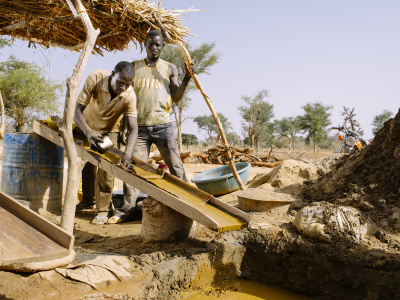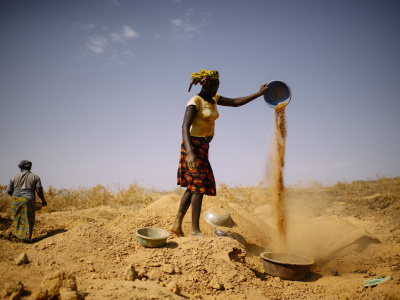
Responsible mining: Partnership to help achieve the SDGs
Partnerships in the mining sector can contribute to sustainable development. A group of large mining companies is working towards such partnerships at a European level.
Mining is a long-term activity. Mines take years to build and to become operational and, once established, will then operate for decades. As a result, the mining sector undertakes long-term investments and requires stable political and fiscal environments.
In addition, as mining activities are often in remote areas, companies rely on local skills and suppliers and are conscious of their need to obtain and retain a social licence to operate from local communities and regional and national governments.
Consequently, mining companies have a strong understanding of the long-term role they have in their operating countries and communities. They also recognise the contributions that they make through the creation of jobs, payment of state revenues through taxes and royalties and consumption of national products and services.
Moreover, mining companies need to generate value for their shareholders, and recognise that a failure to behave in a responsible and transparent manner could negatively impact their commercial objectives.
The value of partnership
Working with partners can support the mining sector’s contribution to social and environmental development. The industry often operates in challenging environmental and political conditions. Partnerships, together with national and local actors as well as international organisations, provide both knowledge and support. This knowledge is an important element in mitigating potential negative impacts. Many mining companies are already partnering with different actors, from NGOs to local government representatives and United Nations (UN) organisations.
Examples of successful partnerships
Rio Tinto worked together with the Government of Madagascar and the Traditional Landowners and forged an agreement helping to create an association supporting civil society groups to provide training in mining legislation, land tenure and forestry.
In partnership with the NGO TechnoServe, Anglo American has developed entrepreneurship programmes in five different countries. In Botswana alone the programme created 230 micro, small and medium enterprises (MSMEs), providing for more than 2,000 jobs. In Peru, Chile and Brazil the two partners with support of the Inter-American Development Bank spent US$6 million over two years to support enterprise development, local supplier development, youth training and workforce redeployment.
Glencore works together with local farmers and the Government in South Africa to develop agricultural activity from subsistence farming in the Greater Tubatse Municipality, Limpopo Province. The project addresses local poverty, job creation and nutrition among the Ga-Pasha community, through growing and selling fresh produce.
BHP Billiton Sustainable Communities, an independent charity established by BHP Billiton, supports an initiative led by PATH to improve the health and development of young children in South Africa and Mozambique. The project has trained hundreds of health care managers and professionals to strengthen health systems and improve service quality. In one district alone, the project helped reduce the number of maternal deaths by 65 percent.
Recognising the potential of partnerships, the International Council for Mining and Minerals (ICMM) has developed a toolbox for successful partnerships.
However, more benefits can be delivered through investigating the partnerships that the mining sector can enter to support the delivery of the sustainable development goals (SDGs). Through corporates working in cooperation with the public sector, including international organisations, national governments and European Union (EU) institutions, there is potential to improve the effectiveness of the various actors’ efforts in contribution to sustainable development.
The mining sector has many years of experience of working in developing countries and is willing to share its knowledge on the steps needed to improve business environments, create jobs and develop skills and training.
The policy framework
The UN 2030 Agenda for Sustainable Development recognises the potential of partnerships with the private sector, and SDG 17 promotes public, private and civil society partnerships. The EU has integrated the 2030 Agenda into its new Consensus for Development, which acknowledges that the involvement of the private sector is necessary for making effective and sustainable development policies. In the communication A Stronger Role of the Private Sector in Achieving Inclusive and Sustainable Growth in Developing Countries, the European Commission (EC) actively supports partnerships with the private sector and outlines principles, criteria and measures for public-private partnerships in development policy.
Towards a partnership
In the EU there is a growing consensus that partnerships with the mining sector can increase the effectiveness of its development policy. However, creating a partnership framework does not happen from one day to the next. So what are the elements that are necessary to make an EU partnership with the mining sector a success?
The International Group of Mining Companies (IGMC), consisting of Anglo American, BHP Billiton, Glencore and Rio Tinto, has initiated a multi-stakeholder dialogue with development partners from the EC, UN Development Programme, UN Environment, NGOs and national authorities to address this question, which led to a number of initial recommendations:
- a partnership can only work if the parties have common objectives and are honest and transparent about them;
- partnerships should be equal and be built on trust; roles and responsibilities should be clearly defined;
- partnerships need to be strategic for all partners in order to be sustainable;
- partnerships should be holistic; they should not only focus on a single SDG, as all goals are interdependent;
- each partner should leverage core competences and capitalise on local partnerships to achieve larger impact and systemic change;
- the objectives of the partnership should be aligned with the countries’ national plans and roadmaps;
- every partner needs to have strong administrative and institutional skills in order to avoid asymmetry in the partnership.
Such dialogue is a first step towards a more structured engagement at a European level that aims to establish a framework for concrete partnerships to support the delivery of the SDGs in Africa. The next step of this initiative will be to identify areas in which such a partnership could be most effective in order to identify concrete actions.
About the authors
Written for the International Group of Mining Companies (IGMC) by Pam Bell, Corporate Affairs at Glencore; Lawrence Dechambenoit, Vice President Corporate Relations Africa at Rio Tinto; Rosie Donachie, Head of Corporate Affairs and Sustainability, Europe at BHP Billiton; Arne Koeppel, Head of Research at FTI Consulting, and Richard Morgan, Head of Government Relations at Anglo American.
Read the full magazine issue




